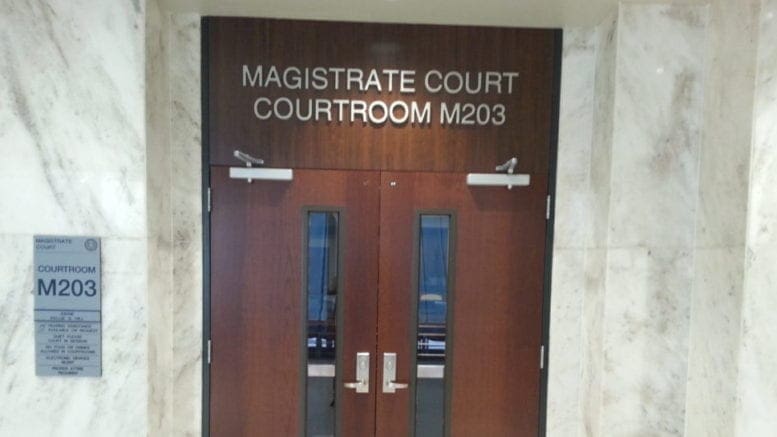By Mark Woolsey
With the expiration of the federal COVID-related rental eviction moratorium this past weekend, advocates for renters, social service agencies, and the courts say they expect an increase in landlords seeking to force non-paying tenants out.
The problem is that nobody really knows how much eviction court cases will jump. One non-profit spokeswoman says it will be “drastic” while others think the increase may be more moderate.
Cobb Chief Magistrate Judge Brendan Murphy, whose magistrate court oversees the bulk of eviction cases in Cobb County, said that around 11 thousand cases were filed by landlords in 2020 and that so far in 2021, the number tops seven thousand.
“We’re certainly seeing that filing has already picked up and we would anticipate with the moratorium ending it will continue to pick up,” he said.
Whatever might occur, Cobb agencies splitting millions in Emergency Rental Assistance money under a program Congress approved earlier this year say they’re prepared. And they contend they’ve been expeditious about disbursing the help, despite criticism that some such programs have gotten off the ground too slowly.
Other observers have brought attention to what they call cumbersome paperwork, with both renters and landlords having to provide substantial documentation.
“It’s going to be a flood of applications for help,“ said renters’ rights advocate Monica DeLancy. “More people will be living in hotels and cars.”
She’s founder and director of a group called the We Thrive in Riverside Renters Association and helps beleaguered renters find resources.
She said that she’s seen emails detailing where applications for relief have been approved and that money has not yet made its way to landlords. She wonders why some relief money seems to be stuck in social service agency bank accounts.
Also, she says, “Some of these agencies don’t have enough manpower to process the applications. I know they’re working hard.”
Murphy and others counter by saying that some 35 percent of the $22.8 million that the Cobb County Board of Commissioners agreed to divide equally among five social service groups has been paid out.
That appears to be much higher than some other jurisdictions.
The Atlanta Journal-Constitution reported Sunday that only about six percent of the $710 million allocated to Georgia and local governments under the program had gone to households at risk of having their belongings wind up curbside.
One of the agencies that received money from the Cobb ERA pot is MUST Ministries. Vice-President of Housing Falecia Stewart said they have shifted some staff in anticipation of a “drastic” jump in applications.
She also said that “We’re finding many (applicants) are having difficulty providing necessary documentation that demonstrates that they actually had a hardship due to COVID-19.” She said those hardships can include being forced onto the unemployment rolls or being able to prove that hours on their jobs were lopped off because of the pandemic.
“The further we get out from last year when things were shut down, schools went virtual etc., the harder it is to show hardship,” said Melanie Kagan of the Center for Family Resources, (CFR) another of the agencies. “But if they were financially impacted at any point they can qualify.”
Kagan said they’ve paid out assistance for about 235 households to the tune of just under $1.5 million. The program allows for assistance up to 12 months and provides that some of the money can be paid ahead to help renters struggle to their feet.
Stewart said they’d handed out roughly the same amount from their allotment and have completed just over 400 applications.
Kagan also lauded a “great partnership” with the magistrate court, with Cobb commissioners recently voting to allocate almost $1.8 million in American Rescue Plan money to the court. The money will fund staff positions and part-time judges to clear a backlog of 1,600 cases filed during the moratorium. With the CDC moratorium at an end, about 1,000 of those cases are set to be heard in August.
“It’ll be busy,” said Murphy, the chief magistrate Judge, “but we’ll make it work.”
A program he fostered putting agencies providing rental assistance plus mediators and legal help on-site on days where eviction cases are heard may get more of a workout.
The courthouse-based help is designed to allow landlords and tenants to meet and work out disputes, possibly negotiate better terms, and cooperate on rental assistance programs without having to go in front of a judge.
Murphy and others also say some may not have heard about the program until now, even though the agencies and county government have put out multiple publicity blasts.
The CFR’s Kagan added that some renters may have incorrectly concluded that they don’t qualify for the program or that they can’t provide all the needed documentation, or even that the moratorium could lead to back rent being forgiven.
Kagan said anybody who thinks they might qualify should contact one of the five agencies now and not wait for an eviction notice.
“We’ve been preparing for this for a while,” said Stewart, with the end of the moratorium having been moved back twice. “But everyone has stepped up and we’re trying to process as many applications as we can.”
